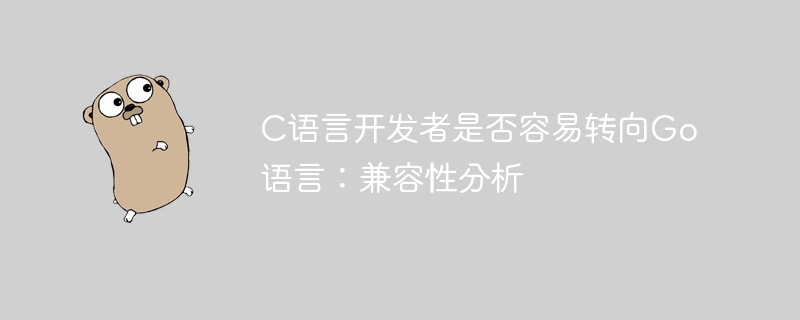

Is it easy for C language developers to switch to Go language: Compatibility Analysis
As the times change, the development of programming languages is also constantly evolving. As a C language developer, is it easy to switch to Go language? This article will analyze it from the perspective of compatibility and provide specific code examples to help readers better understand the connections and differences between the two languages.
C language is a widely used traditional programming language and is used in various system-level programming, embedded development, game development and other fields. The Go language is a statically typed programming language developed by Google, aiming to improve the readability and simplicity of programs while maintaining efficiency and concurrency. So, as a C language developer, will it be a big challenge to switch to Go language? We will analyze it from the following aspects.
C language and Go language have some similarities in syntax and structure, such as basic variable declarations, loops and conditional statements, etc. The following is a simple C language code snippet:
#includeint main() { int i; for (i = 0; i < 5; i++) { printf("Hello, World! "); } return 0; }
And the following is the corresponding Go language code:
package main import "fmt" func main() { for i := 0; i < 5; i++ { fmt.Println("Hello, World!") } }
It can be seen that the two languages are similar in basic structure, so C language developers may have an easier time reading and understanding Go language code. However, the syntax of the Go language is more concise and clear, and may be more convenient to use.
Pointers are widely used in the C language to operate the memory addresses of variables, while the Go language uses a garbage collection mechanism and puts more emphasis on memory. Automatic management. The following is a simple C language code involving pointers:
#includeint main() { int a = 10; int *ptr = &a; printf("The value of a is: %d ", *ptr); return 0; }
In the Go language, the following method can be used for the above code to achieve the same function:
package main import "fmt" func main() { a := 10 ptr := &a fmt.Printf("The value of a is: %d ", *ptr) }
As you can see, although Go The language also supports pointers, but the way of operating pointers is different from the C language. Therefore, C language developers need to relearn some memory management knowledge when using Go language.
Compared with C language, Go language has significant advantages in concurrent programming. The Go language provides natively supported goroutine and channel mechanisms, making writing concurrent programs easier and more efficient. The following is a simple Go language code using goroutine:
package main import ( "fmt" "time" ) func printNumbers() { for i := 0; i < 5; i++ { fmt.Println(i) time.Sleep(time.Second) } } func main() { go printNumbers() time.Sleep(5 * time.Second) }
In the above code, the printNumbers function is started as a goroutine and runs at the same time as the main program. This concurrent programming model is more convenient and intuitive in Go language. In contrast, concurrent programming in C language requires more manual processing and thread management.
In general, as a C language developer, it is not very difficult to switch to Go language. The two languages have some similarities in syntax and structure. At the same time, the simplicity and concurrency of the Go language also make it more suitable for modern application development. Of course, mastering the Go language still requires some learning and practice. I hope the analysis and code examples in this article can help readers better understand the connections and differences between C language and Go language.
The above is the detailed content of Is it easy for C language developers to switch to Go language: Compatibility analysis. For more information, please follow other related articles on the PHP Chinese website!
 Usage of Type keyword in Go
Usage of Type keyword in Go How to implement linked list in go
How to implement linked list in go What are the Go language programming software?
What are the Go language programming software? How to learn go language from 0 basics
How to learn go language from 0 basics What are the methods to implement operator overloading in Go language?
What are the methods to implement operator overloading in Go language? What are the operators in Go language?
What are the operators in Go language? How to open php files on mobile phone
How to open php files on mobile phone What should I do if the USB disk cannot be read on the computer?
What should I do if the USB disk cannot be read on the computer?



